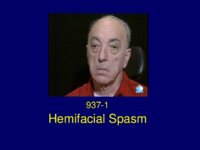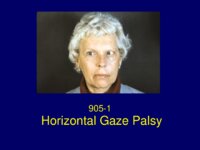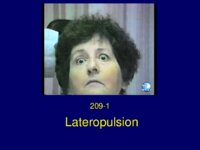Videos, clinical notes and related presentations concerning neuro-ophthalmological and neurovisual disorders collected during Dr. Wray's work as the Director of Neuro-Visual Disorders at Massachusetts General Hospital.
Shirley H. Wray, M.D., Ph.D., FRCP, Professor of Neurology Harvard Medical School, Director, Unit for Neurovisual Disorders, Massachusetts General Hospital.
NOVEL: https://novel.utah.edu/
TO
Filters: Collection: "ehsl_novel_shw"
| Title | History | Type | ||
|---|---|---|---|---|
| 76 |
 |
Familial Myasthenia Gravis | In 1999 Dr. A. G. Engel published a monograph on Myasthenia Gravis and Myasthenic Disorders with a chapter devoted to Congenital Myasthenic Syndromes. Dr. Engel systematically defined and classified hereditary and congenital myasthenic syndromes, delineated on the basis of their electrophysiologi... | Image/MovingImage |
| 77 |
 |
Familial Nystagmus | The mother and her infant son both have conjugate horizontal pendular nysagmus. Diagnosis: Congenital sensory nystagmus Familial Infantile Nystagmus Syndrome (INS) The little boy is a bright active child with normal development. He has pendular nystagmus in central gaze without a head turn or h... | Image/MovingImage |
| 78 |
 |
Fascicular Third Nerve Palsy | The patient is a 76 year old woman who woke one morning unable to see out of her right eye because of ptosis. She came to the Massachusetts General Hospital emergency room and was admitted. Neurological Examination: Right third nerve palsy involving the pupil Ataxia of the left hand on finger-nose t... | Image/MovingImage |
| 79 |
 |
Fisher's One and a Half Syndrome | The patient is a 62 year old right handed man, status post myocardial infarction in 1989 and on Coumadin. In 1993 he presented with a history of three separate TIAs 1. Instantaneous perioral tingling and/or numbness lasting less than 1 minute. 2. Episodic numbness of the right hand and foot lasti... | Image/MovingImage |
| 80 |
 |
Fisher's One and a Half Syndrome | The patient is a 56 year old woman who was seen by a Stroke Consult on the cardiac unit because she had difficulty opening her left eye and diplopia looking to the right. On examination she had ptosis OS and "a partial ophthalmoplegia" sparing the pupil. Diagnosis Partial left third nerve palsy.... | Image/MovingImage |
| 81 |
 |
Fisher's One and a Half Syndrome | This 28 year old woman had severe multiple sclerosis with a spastic paraparesis due to a lesion of the spinal cord. She was admitted to the Intensive Care Unit complaining of dizziness and double vision. Neuro-ophthalmologic examination: Visual acuity 20/30 OU Pupils, visual fields and fundi normal ... | Image/MovingImage |
| 82 |
 |
Fisher's One and a Half Syndrome | This young patient presented with double vision and was found to have on examination the classical findings of Fisher's one-and-a-half syndrome which are: • Right internuclear ophthalmoplegia on gaze left with adduction weakness OD • Right horizontal gaze paresis with gaze evoked nystagmus • F... | Image/MovingImage |
| 83 |
 |
Fisher's One and a Half Syndrome | This 44 year old woman presented in 1973 with an acute attack of optic neuritis in the right eye that fully recovered after a course of ACTH therapy. In 1991, 18 years later, she developed unsteadiness of gait, "walking like a chicken", stiff legs that jerked spontaneously in bed at night, and num... | Image/MovingImage |
| 84 |
 |
Fisher's One and a Half Syndrome | This young man was seen in the emergency room of his local hospital following the onset of severe headache, mild confusion and diplopia. Non-contrast CT brain scan showed: A right pontine hemorrhage He was transferred to the Massachusetts General Hospital ICU. Ocular Motility: Esotropia of the r... | Image/MovingImage |
| 85 |
 |
Fourth Nerve Palsy | The patient is a 32 year old, left handed chemistry teacher who presented with intermittent vertical double vision. In August 1992 she noted, particularly late in the evening when reading in bed, vertical double vision. The images were one on top of the other and on occasions one image was slig... | Image/MovingImage |
| 86 |
 |
Fourth Nerve Palsy | The patient is a 64 year old engineer who noted whilst driving around Thanksgiving time double vision with one image on top of the other. Vertical double vision persisted and he was referred to the Massachusetts General Hospital for evaluation. Past History: 1991 Hyperthyroidism with Graves' Dise... | Image/MovingImage |
| 87 |
 |
Frontotemporal Dementia | The patient is a 68 year old right handed retired air conditioner repair man who presented with impaired balance and slow walking. For about one year he had noted difficulty lifting his feet high enough when climbing the stairs. From that time on, his movements slowed and worsened so that he had ... | Text |
| 88 |
 |
Gaucher's Disease | This little boy has Gaucher's disease. Gaucher's disease is an autosomal recessive disorder, linked to chromosome 1q21, due to glucocerebroside β-glucosidase deficiency. There are three phenotypic variances of Gaucher's disease. Type I is the most common and lacks neurological features. Type 2 is... | Image/MovingImage |
| 89 |
 |
Global Supranuclear Paralysis of Vertical Gaze | This case was presented to the Clinical Eye Movement Society at the American Neurological Association Meeting in October 2007. The patient is a healthy, 36 year old Lieutenant Commander in the Coast Guard who was last seen perfectly well at 2 a.m. on the day of admission. He awoke in the morning ... | Image/MovingImage |
| 90 |
 |
Hemifacial Spasm | The patient is a 72 year old man with myopia, childhood exotropia, progressive age related ptosis and right hemifacial spasm. Hemifacial spasm (HS) most often begins insidiously in the orbicularis oculi muscle in the early stages, as in this man. He presented with a 2 year history of involuntary t... | Text |
| 91 |
 |
Hemifacial Spasm | The patient is a 72 year old man with myopia, childhood exotropia, progressive age related ptosis and right hemifacial spasm. Hemifacial spasm (HS) most often begins insidiously in the orbicularis oculi muscle in the early stages, as in this man. He presented with a 2 year history of involuntary t... | Image/MovingImage |
| 92 |
 |
Hemifacial Spasm: Eyelid Twitching | This patient is an atypical case of hemifacial spasm because he is a young college student only 29 years of age. Hemifacial spasm usually develops in the fifth and sixth decade of life and affects women more than men. It often begins insidiously in the orbicularis oculi muscle in the early stage... | Image/MovingImage |
| 93 |
 |
Horizontal Gaze Palsy | This 56 year old woman with known adenocarcinoma of the breast presented with the recent onset of horizontal diplopia and deviation of her left eye inwards. Her oncologist referred her for a neuro-ophthalmic evaluation. This 56 year old woman with known adenocarcinoma of the breast presented with... | Text |
| 94 |
 |
Information Processing in the Visual System: David H. Hubel, Nobel Laureate Physiology or Medicine 1981 | David H. Hubel is the John Enders University Professor of Neurobiology at Harvard Medical School. Born in Canada of American parents, he grew up in Montreal, graduated from McGill Medical School, and received training in neurology at the Montreal Neurological Institute and Johns Hopkins Hospital. ... | Image/MovingImage |
| 95 |
 |
Internuclear Ophthalmoplegia in Childhood (Guest Lecture) | Text | |
| 96 |
 |
Jaw Winking | This young boy was born at full term after a normal pregnancy with congenital unilateral ptosis of the left eyelid. His mother noticed that when he was sucking on a bottle the ptotic eyelid opened and closed. A diagnosis of the Marcus-Gunn jaw winking phenomenon was made. The first case of thi... | Image/MovingImage |
| 97 |
 |
Jaw Winking | This little boy was born with congenital ptosis of the left eyelid, which "flicked up and down" when his jaw moved. The pediatrician made a diagnosis of the Marcus-Gunn jaw winking phenomenon was made. The first case of this unusual synkinesis between the pterygoid muscles and the levator musc... | Image/MovingImage |
| 98 |
 |
Latent Nystagmus | This is one of the first cases of latent nystagmus that I saw with Dr. Cogan in the 1970's. The presence of latent nystagmus was unknown to this patient, a little girl who was found to have latent nystagmus by the ophthalmologist at school trying to test the vision of each eye separately. When she... | Image/MovingImage |
| 99 |
 |
Lateropulsion | This 60 year old patient has Wallenberg's syndrome due to infarction of the left dorsolateral medulla. Wallenberg's syndrome is the best recognized syndrome involving the vestibular nuclei and adjacent structures. Unilateral infarcts affecting the vestibular nuclei may produce an oculomotor imbalanc... | Image/MovingImage |
| 100 |
 |
Lateropulsion | This 60 year old patient has Wallenberg's syndrome due to infarction of the left dorsolateral medulla. Wallenberg's syndrome is the best recognized syndrome involving the vestibular nuclei and adjacent structures. Unilateral infarcts affecting the vestibular nuclei may produce an oculomotor imbalanc... | Text |
